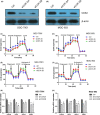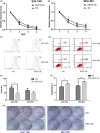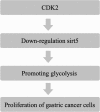CDK2 positively regulates aerobic glycolysis by suppressing SIRT5 in gastric cancer
- PMID: 29896817
- PMCID: PMC6113437
- DOI: 10.1111/cas.13691
CDK2 positively regulates aerobic glycolysis by suppressing SIRT5 in gastric cancer
Abstract
Although significant progress has been made in the diagnosis and treatment of gastric cancer, the overall survival rate of the disease remains unchanged at approximately 20%-25%. Thus, there is an urgent need for a better understanding of the molecular biology aspects of the disease in the hope of discovering novel diagnosis and treatment strategies. Recent years have witnessed decisive roles of aberrant cancer cell metabolism in the maintenance of malignant hallmarks of cancers, and cancer cell metabolism has been regarded as a novel target for the treatment of cancer. CDK2, a cell cycle-dependent kinase that usually regulates cell cycle progression and the DNA damage response, is reported to be upregulated in many cancers. However, little is known about its role in cancer cell metabolism. In the present study, we showed that silencing CDK2 inhibited the aerobic glycolytic capacity of gastric cancer cell lines. Mechanism explorations showed that silencing CDK2 increased expression of the SIRT5 tumor suppressor. In addition, the physiological roles of SIRT5 in the regulation of proliferation and glycolysis were studied in gastric cancer cells. Taken together, the present study uncovered novel roles of the CDK2/SIRT5 axis in gastric cancer and suggests future studies concerning gastric cancer cell metabolism.
Keywords: CDK2; CDK2/SIRT5; SIRT5; gastric cancer; glycolysis.
© 2018 The Authors. Cancer Science published by John Wiley & Sons Australia, Ltd on behalf of Japanese Cancer Association.
Figures






References
-
- Siegel RL, Miller KD, Jemal A. Cancer Statistics, 2017. CA Cancer J Clin. 2017;67(1):7‐30. - PubMed
-
- Moon YW, Jeung H‐C, Rha SY, et al. Changing patterns of prognosticators during 15‐year follow‐up of advanced gastric cancer after radical gastrectomy and adjuvant chemotherapy: a 15‐year follow‐up study at a single Korean institute. Ann Surg Oncol. 2007;14(10):2730‐2737. - PubMed
-
- Koppenol WH, Bounds PL, Dang CV. Otto Warburg's contributions to current concepts of cancer metabolism. Nat Rev Cancer. 2011;11(5):325‐337. - PubMed
MeSH terms
Substances
LinkOut - more resources
Full Text Sources
Other Literature Sources
Medical
Research Materials

